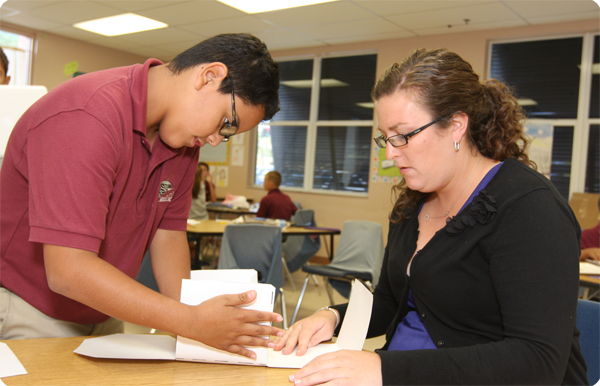Philosophy

Philosophy based on the Developmental-Interaction Approach
Trinity School for Children, a charter school within the Hillsborough County School District, Tampa, Florida, has replicated the laboratory school established in 1916 by Lucy Sprague Mitchell at the Bank Street College of Education, New York. Today, that laboratory school is known as the Bank Street School for Children.
The single most important organizing principle of the developmental-interaction approach is that in order for children to learn in school and to become lifelong learners, they must interact with their environment (people, places, things) and interpret their experience. For example, a toddler discovers the joy of watching an object hit the floor when dropped from a highchair and repeats the action over and over again. The repetition provides the toddler with an experience to help them understand the new knowledge gained. Our students, at all ages and different sophisticated levels engage in building, cooking, labs, painting and field studies to name a few, as a means to construct understanding and increased knowledge threw basic life experiences.
The developmental-interaction approach encompasses the following three ideas related to how we approach teaching here at Trinity:
Experiential Education - carefully designed and executed educational experiences that are reconstructed and reflected upon in a variety of ways such as talking, drawing, building, acting.
Constructivism - the idea that a child makes discoveries from observations, explorations, and experiences and uses all of these to construct understanding. Constructivists believe that the child is the “maker of meaning”.
Ownership of Learning - because a student is directly involved with the environment and the assorted learning experiences, he/she is more invested and excited about learning.
 Our philosophy demands that we organize our classroom environments in a way that encourages a child to explore learning opportunities, use teaching strategies that engage children to make discoveries and "make meaning" of their learning.
Our philosophy demands that we organize our classroom environments in a way that encourages a child to explore learning opportunities, use teaching strategies that engage children to make discoveries and "make meaning" of their learning.
Our studies at all levels have social studies at its core. Units of study can take one month, three months or last throughout the year. Learning in a Trinity classroom is as much a social process as a solitary one. The teacher is a facilitator of learning and the students collaborate with each other, share individual responses about artifacts, a story, a historical document, or shared experience. Students work in small groups and are tasked to create skits, posters, recreate characters or models and present to the rest of the class a particular content idea. For example, a group of Middle School students may be asked to create a mural depicting the water cycle rather than filling workbook pages. By recreating their learning, the information becomes a part of the student creating a better understanding of the subject matter.
A Lower School group of students may open a bakery to sell baked goods to the rest of the school in order to better understand economics. The children often respond to their own reading and writing by meeting together in small groups and talking about their work. Teachers, as facilitators with expectations, act as guides and plan for rich experiences from which then students can construct meaning with increased depth and complexity. When our students branch into our Upper School, they emerge into facilitators of their own learning. Their work is extended and shared with the rest of the students at Trinity. For example, the Upper School students recreate the Festival of the Nile, an outgrowth of their study of Egypt or a Day in the Colonies, an out growth of their study of Colonial Times. The use of technology is integrated at a higher level of sophistication in order to help facilitate sharing information throughout the grades.
Through our work here at Trinity School for Children, the integrity of each child in his/her role as learner, teacher, classmate is valued and reinforced.

